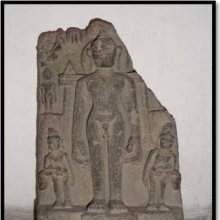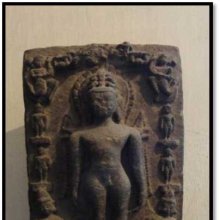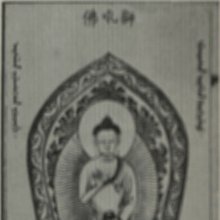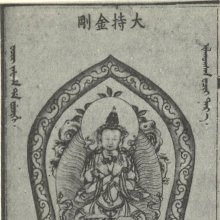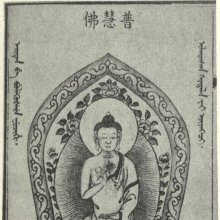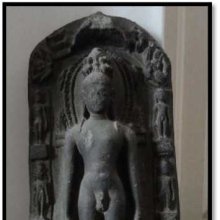Jina, Jīna: 24 definitions
Introduction:
Jina means something in Buddhism, Pali, Hinduism, Sanskrit, Jainism, Prakrit, the history of ancient India, Marathi, Hindi. If you want to know the exact meaning, history, etymology or English translation of this term then check out the descriptions on this page. Add your comment or reference to a book if you want to contribute to this summary article.
Alternative spellings of this word include Gene.
Images (photo gallery)
(+6 more images available)
In Hinduism
Ganitashastra (Mathematics and Algebra)
Source: archive.org: Hindu MathematicsJina (जिन) represents the number 24 (twenty-four) in the “word-numeral system” (bhūtasaṃkhyā), which was used in Sanskrit texts dealing with astronomy, mathematics, metrics, as well as in the dates of inscriptions and manuscripts in ancient Indian literature.—A system of expressing numbers by means of words arranged as in the place-value notation was developed and perfected in India in the early centuries of the Christian era. In this system the numerals [e.g., 24—jina] are expressed by names of things, beings or concepts, which, naturally or in accordance with the teaching of the Śāstras, connote numbers.

Ganitashastra (शिल्पशास्त्र, gaṇitaśāstra) refers to the ancient Indian science of mathematics, algebra, number theory, arithmetic, etc. Closely allied with astronomy, both were commonly taught and studied in universities, even since the 1st millennium BCE. Ganita-shastra also includes ritualistic math-books such as the Shulba-sutras.
In Buddhism
Mahayana (major branch of Buddhism)
Source: academia.edu: A Study and Translation of the GaganagañjaparipṛcchāJīna (जीन) refers to the “victorious one”, according to the Gaganagañjaparipṛcchā: the eighth chapter of the Mahāsaṃnipāta (a collection of Mahāyāna Buddhist Sūtras).—Accordingly, “[...] The Bodhisattva Gaganagañja then sustained the jewel-canopy of ten thousand yojanas high over the Lord’s lion throne in the sky, joined the palms of his hands, saluted, and praised the Lord with these suitable verses: ‘[...] (2) Victorious One (jīna) whose absolute body (dharmakāya) is the same as the manifested (prabhāvita) body, displayed his beautiful body (abhirūpa) as endowed with well-shaped forms (surūpa), having produced (prajanita) compassion (karuṇā) that brings benefits for living beings, reveals the supreme body which has the marks of hundredfold merits (śatapuṇya-lakṣaṇa). [...]’”.

Mahayana (महायान, mahāyāna) is a major branch of Buddhism focusing on the path of a Bodhisattva (spiritual aspirants/ enlightened beings). Extant literature is vast and primarely composed in the Sanskrit language. There are many sūtras of which some of the earliest are the various Prajñāpāramitā sūtras.
Tibetan Buddhism (Vajrayana or tantric Buddhism)
Source: OSU Press: Cakrasamvara SamadhiJina (जिन) refers to a “victor”, according to the Guru Mandala Worship (maṇḍalārcana) ritual often performed in combination with the Cakrasaṃvara Samādhi, which refers to the primary pūjā and sādhanā practice of Newah Mahāyāna-Vajrayāna Buddhists in Nepal.—Accordingly, “In praise (of) Śrī Vajrasattva, highest universal guru, origin of all Buddhas, By various forms, removing darkness and fear, fixed resting on Meru. Dharma sustainer, chief sage, most fortunate victor (jina-vara-subhagaṃ), Vajradhātu mandala, In one form with all bliss, innate bliss, embodied, the cause for liberation”.
Source: MDPI Books: The Ocean of HeroesJina (जिन) refers to the “Victors” (during the fortunate aeon), according to the 10th-century Ḍākārṇava-tantra: one of the last Tibetan Tantric scriptures belonging to the Buddhist Saṃvara tradition consisting of 51 chapters.—Accordingly: [while explaining the body circle (kāyacakra)]: “[...] Nevertheless, on the circles of the husbands and others (consort goddesses), all of them are visualized as the Victors (jina) during the Fortunate Aeon, [in number], differentiated by difference in [their] names and qualities, in the nature of the Emanation Body. [...]”.

Tibetan Buddhism includes schools such as Nyingma, Kadampa, Kagyu and Gelug. Their primary canon of literature is divided in two broad categories: The Kangyur, which consists of Buddha’s words, and the Tengyur, which includes commentaries from various sources. Esotericism and tantra techniques (vajrayāna) are collected indepently.
In Jainism
General definition (in Jainism)
Source: Encyclopedia of Jainism: Tattvartha Sutra 9: Influx of karmasJina (जिन).—Who are referred by the word jina here? The practitioner in the 13th stage (omniscient with activities) and 14th stage (omniscient without activities) of spiritual purification (guṇasthāna) are referred here.

Jainism is an Indian religion of Dharma whose doctrine revolves around harmlessness (ahimsa) towards every living being. The two major branches (Digambara and Svetambara) of Jainism stimulate self-control (or, shramana, ‘self-reliance’) and spiritual development through a path of peace for the soul to progess to the ultimate goal.
India history and geography
Source: Cologne Digital Sanskrit Dictionaries: Indian Epigraphical GlossaryJina.—same as Tīrthaṅkara. (IE 7-1-2), ‘twentyfour’. (LL), an epithet of the Buddha. Note: jina is defined in the “Indian epigraphical glossary” as it can be found on ancient inscriptions commonly written in Sanskrit, Prakrit or Dravidian languages.
Source: Singhi Jain Series: Ratnaprabha-suri’s Kuvalayamala-katha (history)Jina (जिन) was once with reference to Buddha and Buddhism, according to “A Cultural note on the Kuvalayamala of Uddyotanasuri” by the late Dr. V. s. Agrawala.—The Kuvalayamala (779 A.D.) is full of cultural material which gains in value because of the firm date of its composition. [...] During the 7th century, in the writings of Bāṇa, the terms Jina, Jinendra, Jinanātha and Jaina were used with reference to Buddha and Buddhism, and the same is the case in the Amarakośa and the Lalitavistara, etc. It is an open question as to when for the first time the word Jaina was used in its present meaning.

The history of India traces the identification of countries, villages, towns and other regions of India, as well as mythology, zoology, royal dynasties, rulers, tribes, local festivities and traditions and regional languages. Ancient India enjoyed religious freedom and encourages the path of Dharma, a concept common to Buddhism, Hinduism, and Jainism.
Languages of India and abroad
Pali-English dictionary
Source: BuddhaSasana: Concise Pali-English Dictionaryjina : (m.) the conqueror; the victor; the Buddha. || jīna (pp. of jīyati), become old; decayed. (adj.) diminished; wasted; deprived of.
Source: Sutta: The Pali Text Society's Pali-English DictionaryJīna, (pp. of jīyati) diminished, wasted, deprived of (with Acc. or Abl.) having lost; with Acc. : J. III, 153, 223, 335; V, 99 (atthaṃ: robbed of their possessions; Com. parihīna vinaṭṭha).—with Abl. : J. V, 401 (read jīnā dhanā). (Page 284)
— or —
Jina, (pp. med. of jayati) conquering, victorious, often of the Buddha, “Victor”: jitā me pāpakā dhammā tasmâhaṃ Upaka jino ti Vin. I, 8=M. I, 171; Vin. V, 217; Sn. 379, 697, 989, 996. magga° conqueror of the Path Sn. 84 sq.; saṃsuddha° (id.) Sn. 372. Cp khetta°. In other connections: Pv IV. 333; Th. 2, 419 (jin’amhase rūpinaṃ Lacchiṃ explained at ThA. 268 as jinā amhase jinā vat’amha rūpavatiṃ Siriṃ).

Pali is the language of the Tipiṭaka, which is the sacred canon of Theravāda Buddhism and contains much of the Buddha’s speech. Closeley related to Sanskrit, both languages are used interchangeably between religions.
Marathi-English dictionary
Source: DDSA: The Molesworth Marathi and English Dictionaryjina (जिन).—m S The generic name of the personage peculiar to the jaina sect. 2 A generic name applied to the chief saints of the baudhda sect.
--- OR ---
jinā (जिना).—m ( P) A staircase; a flight of steps.
--- OR ---
jīna (जीन).—n m ( P) A saddle. Esp. understood of the European saddle.
Source: DDSA: The Aryabhusan school dictionary, Marathi-Englishjinā (जिना).—m A staircase, a flight of steps.
--- OR ---
jīna (जीन).—n m A saddle.
Marathi is an Indo-European language having over 70 million native speakers people in (predominantly) Maharashtra India. Marathi, like many other Indo-Aryan languages, evolved from early forms of Prakrit, which itself is a subset of Sanskrit, one of the most ancient languages of the world.
Sanskrit dictionary
Source: DDSA: The practical Sanskrit-English dictionaryJina (जिन).—a. [ji-nak]
1) Victorious, triumphant.
2) Very old.
-naḥ 1 A generic term applied to a chief Bauddha or Jaina saint.
2) N. applied to the Arhats of the Jainas.
3) A very old man.
4) An epithet of Visnu.
--- OR ---
Jīna (जीन).—a. [jyā-kta saṃprasā° dīrghaḥ] Old, aged, decayed.
-naḥ A leather bag; जीनकार्मुकबस्तावीन् पृथग् दद्याद्विशुद्धये (jīnakārmukabastāvīn pṛthag dadyādviśuddhaye) Manusmṛti 11.139.
Source: Cologne Digital Sanskrit Dictionaries: Shabda-Sagara Sanskrit-English DictionaryJina (जिन).—mfn.
(-naḥ-nā-naṃ) Victorious, triumphant. m.
(-naḥ) 1. A Jina, the generic name of the personage peculiar to the Jaina sect, who is ranked by them as superior to the gods of the other sects: a saint and teacher: twenty-four Jinas are supposed to flourish in an Avasarpini or Jaina age, and their writers enumerate those of the ages past, present, and to come. 2. A Bud'dha; a generic term applied to the chief saints of the Bud'dha sect, in the same manner as to those of the Jainas. 3. A name of Vishnu. 4. A very old man. 5. A sage, one who is omniscient. E. ji to conquer or excel, nak Unadi aff.
--- OR ---
Jīna (जीन).—mfn.
(-naḥ-nā-naṃ) Old, aged. E. jyā to become old, kta affix, deriv. irr.
Source: Cologne Digital Sanskrit Dictionaries: Benfey Sanskrit-English DictionaryJina (जिन).—[ji + na], n. A name of Buddha. [Pañcatantra] 236, 8.
--- OR ---
Jīna (जीन).—I. ptcple. pf. pass. of jyā. Ii. n. A leathern pouch, [Mānavadharmaśāstra] 11, 138.
Source: Cologne Digital Sanskrit Dictionaries: Cappeller Sanskrit-English DictionaryJina (जिन).—[masculine] a Buddha or Arhant.
--- OR ---
Jīna (जीन).—[masculine] a leather bag.
Source: Cologne Digital Sanskrit Dictionaries: Monier-Williams Sanskrit-English Dictionary1) Jina (जिन):—1. jina mfn. (√ji) victorious, [cf. Lexicographers, esp. such as amarasiṃha, halāyudha, hemacandra, etc.]
2) m. ‘Victor’, a Buddha, [Buddhist literature; Kathāsaritsāgara lxxii, 99]
3) an Arhat (or chief saint of the Jainas; 24 Jinas are supposed to flourish in each of the 3 Avasarpiṇīs, being born in Āryāvarta), [Jaina literature; Pañcatantra v, 1, 10/11 ff.; Varāha-mihira’s Bṛhat-saṃhitā lx; Sarvadarśana-saṃgraha]
4) (hence) the number ‘24’ [Hemādri’s Caturvarga-cintāmaṇi i, 3, 919]
5) metrically for jaina
6) Viṣṇu, [Śiśupāla-vadha xix, 112]
7) Name of [Hemacandra] (?)
8) of a Bodhi-sattva
9) of a son of Yadu, [Kūrma-purāṇa i, 22, 12.]
10) 2. jina mfn. (for jīna or jīrṇa) very old, [Uṇādi-sūtra iii, 2/3.]
11) Jīna (जीन):—[from jyā] mfn. ([Pāṇini 8-2, 44; vi, 4, 2; Kāśikā-vṛtti]) old, aged, [cf. Lexicographers, esp. such as amarasiṃha, halāyudha, hemacandra, etc.]
12) [v.s. ...] n. a leather bag (‘woollen cover’ [Jaina literature [Scholiast or Commentator]]), [Manu-smṛti xi, 139] (jīla, [Gautama-dharma-śāstra xxii]; jāla [Scholiast or Commentator])
Source: Cologne Digital Sanskrit Dictionaries: Yates Sanskrit-English Dictionary1) Jina (जिन):—(naḥ) 1. m. A Jaina; Vishnu; an old man. a. Victorious.
2) Jīna (जीन):—[(naḥ-nā-naṃ)] 1. m. Aged, old.
Source: DDSA: Paia-sadda-mahannavo; a comprehensive Prakrit Hindi dictionary (S)Jina (जिन) in the Sanskrit language is related to the Prakrit word: Jiṇa.
[Sanskrit to German]
Sanskrit, also spelled संस्कृतम् (saṃskṛtam), is an ancient language of India commonly seen as the grandmother of the Indo-European language family (even English!). Closely allied with Prakrit and Pali, Sanskrit is more exhaustive in both grammar and terms and has the most extensive collection of literature in the world, greatly surpassing its sister-languages Greek and Latin.
Hindi dictionary
Source: DDSA: A practical Hindi-English dictionary1) Jina (जिन) [Also spelled jin]:—(nm) lord Buddha; the Jain Tirthankars (see); (pro) the plural form of [jisa].
2) Jinā (जिना):—(nm) adultery: ~[kāra] an adulterer; adulterous; ~[kārī] adultery; —[bila-jabra] rape.
3) Jīna (जीन) [Also spelled gene]:—(nf) a saddle; a kind of thick suiting (cloth); ~[sāja] a saddle maker; ~[sājī] saddle-making.
4) Jīnā (जीना):—(v) to live, to be alive;[jī uṭhanā] to be revived, to be infused with new life; —[dūbhara karanā] to make it too hot for, to make life hell; —[dūbhara yā bhārī ho jānā] the life to become a burden or an impossibility, life to become too hot; [jīne kā majā] pleasure of life.
5) (nm) a staircase, ladder.
...
Prakrit-English dictionary
Source: DDSA: Paia-sadda-mahannavo; a comprehensive Prakrit Hindi dictionary1) Jiṇa (जिण) in the Prakrit language is related to the Sanskrit word: Jina.
2) Jīṇa (जीण) also relates to the Sanskrit word: Ajina.
Prakrit is an ancient language closely associated with both Pali and Sanskrit. Jain literature is often composed in this language or sub-dialects, such as the Agamas and their commentaries which are written in Ardhamagadhi and Maharashtri Prakrit. The earliest extant texts can be dated to as early as the 4th century BCE although core portions might be older.
Kannada-English dictionary
Source: Alar: Kannada-English corpusJina (ಜಿನ):—[adjective] of limited size; of comparatively restricted dimensions; not big; little; small.
--- OR ---
Jina (ಜಿನ):—
1) [noun] that which is small in size; a little thing.
2) [noun] a male child; a boy.
--- OR ---
Jina (ಜಿನ):—
1) [adjective] won; victorious; triumphed.
2) [adjective] firmly established; not changing or fluctuating; fixed; stable.
--- OR ---
Jina (ಜಿನ):—
1) [noun] a Buddhist or Jaina spiritual teacher.
2) [noun] (Jain.) any of the twenty four recognised spiritual teachers.
3) [noun] (Buddh.) Gautama Buddha, the founder of Buddhism.
4) [noun] he who has subdued his worldly passions.
5) [noun] Viṣṇu.
6) [noun] a symbol for the number twenty-four.
--- OR ---
Jīṇa (ಜೀಣ):—[noun] = ಜೀನ [jina]1.
--- OR ---
Jīna (ಜೀನ):—[noun] a greedy, stingy man who hoards money for its own sake, even at the expense of personal comfort; a miser.
--- OR ---
Jīna (ಜೀನ):—[noun] an old man.
--- OR ---
Jīna (ಜೀನ):—[noun] = ಜೀನು [jinu]1.
--- OR ---
Jīna (ಜೀನ):—[noun] a religion founded in the 6th century B.C. as a revolt against the then prevalent Hinduism and emphasising the perfectibility of human nature and liberation of the soul, esp. through asceticism and non-violence toward all living creatures; Jainism.
Kannada is a Dravidian language (as opposed to the Indo-European language family) mainly spoken in the southwestern region of India.
Nepali dictionary
Source: unoes: Nepali-English DictionaryJina (जिन):—n. 1. Buddha; 2. Tirthankar of Jain religion; 3. Vishnu;
Nepali is the primary language of the Nepalese people counting almost 20 million native speakers. The country of Nepal is situated in the Himalaya mountain range to the north of India.
See also (Relevant definitions)
Starts with (+159): Jina extranjera, Jina forondo, Jina-bhavana, Jina-kalpin, Jina-matri, Jina-nagara, Jina-nigama, Jina-yugma, Jinabandhu, Jinabandi, Jinabhadra, Jinabhadra suri, Jinabhadrasuri, Jinabhakti, Jinabhaktisuri, Jinabhashita, Jinabhaskara, Jinabhigama, Jinabhumi, Jinabimbapratishtha.
Ends with (+79): Abhijina, Adajina, Adijina, Ajina, Anantajina, Anartvijina, Anusamvrijina, Arttvijina, Artvijina, Asam tjina, Avrijina, Bastajina, Bejina, Bhajina, Bhuvajina, Caturvimshatijina, Dandajina, Dantajina, Dvikulijina, Ekanajina.
Full-text (+1105): Jaina, Jila, Jinendra, Jinasadman, Jinasasana, Tatharaja, Bodhi, Rishabhanana, Jya, Manikusuma, Jinakalpa, Purbbajina, Suparshvaka, Arttvijina, Adijina, Pancatirthika, Nyagrodha, Tritirthika, Adinatha, Vandana.
Relevant text
Search found 76 books and stories containing Jina, Jīna, Jinā, Jīnā, Jiṇa, Jīṇa; (plurals include: Jinas, Jīnas, Jinās, Jīnās, Jiṇas, Jīṇas). You can also click to the full overview containing English textual excerpts. Below are direct links for the most relevant articles:
Jain Remains of Ancient Bengal (by Shubha Majumder)
Image worship in Jainism < [Chapter 6 - Iconographic Study of Jaina Sculptural Remains]
Caubisi type of Pārśvanātha Sculptures < [Chapter 6 - Iconographic Study of Jaina Sculptural Remains]
Pañca-tīrthika type of Candraprabha sculptures < [Chapter 6 - Iconographic Study of Jaina Sculptural Remains]
The Tattvasangraha [with commentary] (by Ganganatha Jha)
Verse 2049-2050 < [Chapter 23 - External World]
Verse 3438-3440 < [Chapter 26 - Examination of the ‘Person of Super-normal Vision’]
Verse 3526-3527 < [Chapter 26 - Examination of the ‘Person of Super-normal Vision’]
Verses on the Perfection of Wisdom
Shishupala-vadha (Study) (by Shila Chakraborty)
Buddhism, Jainism and Charvakism in the Śiśupālavadha < [Introduction]
Jainism in Odisha (Orissa) (by Ashis Ranjan Sahoo)
Jain Art in Odisha (Introduction) < [Chapter 5]
Jaina Sculptures of Odisha in Foreign Museums < [Chapter 3: Survey of Jaina Antiquities in Odisha]
Jain Iconography in Odisha (Introduction) < [Chapter 6]
Trishashti Shalaka Purusha Caritra (by Helen M. Johnson)
Part 4: Birth-rites of Śānti < [Chapter V - Twelfth incarnation as Śānti]
Part 6: The birth-bath of Sambhava < [Chapter I - Sambhavajinacaritra]
Part 9: The future Vāsudevas < [Chapter VI]
Related products
